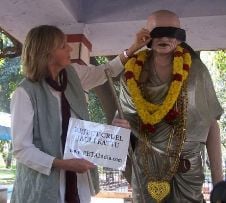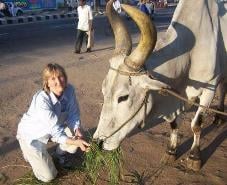An Interview with Ingrid
 |
A couple of weeks ago, I posted a blog asking if people had a specific question for Ingrid, and it turns out that a lot of people do! She’s just back from her trip to India (for more on how that went, click here), and she took some time today to respond to the questions. You can read the resulting “interview with Ingrid” below. Not all the comments and emails I received are addressed in this interview (otherwise this entry would be, like, 12 pages long), but if you asked a question that’s not featured here, I’ll hit you up with a response by email. Enjoy!
When did you become a vegetarian/vegan and what exactly prompted you to make that decision?
In my book, Making Kind Choices, I talk about what a slow learner I was. How I first stopped eating escargot after watching some snails looking for an escape route out of a paper bag, shellfish after ordering a lobster on my birthday and realizing he was broiled alive for my fleeting taste, and finally, going vegetarian after rescuing a little pig abandoned on a farm to starve to death. It was hard 45 or more years ago, now it’s easy as (tofu cream) pie.
I am only a kid but I saw your show and know all I want to do is help. But how?
Every one of us, no matter if under eight or over eighty, is powerful. We all influence the marketplace. You may send PETA $50 (and we are grateful) but you spend thousands a year on food, household products, shampoo, clothes, entertainment, gardening supplies, candles, I don’t know what all. If those goods are tested on animals or made from the parts of animals who have suffered greatly in slaughterhouses, or come at the expense of animals being carted around in small cages (the circus, for instance), then we have a problem. But if you choose compassionately, then you are a powerful consumer. And your voice, the leaflets you leave everywhere, will educate others and get them to understand. Your advocacy makes a whole world of difference.
There are quite a few chain clothing stores that sell fur and fur trim. How does PETA choose which ones to target for a campaign?
 |
I would love to know your stand on giving drugs to animals. Both my husband and I are vegans and have made the decision not to use drugs tested on animals but find it really hard when one of my animals need medication.
You are lovely people. If there is a non-tested (natural) remedy, great. If not, well, please do all you can to join us in pushing the FDA to change its outdated animal testing methods for 21st century tests. After all, we have whole human DNA on the web and super-computers we can program with the right data for the right species.
When people ask me, ‘why do you care about animals?’ I am starting to feel stuck with answers and was wondered if you have any really good comebacks when you are asked question’s like that?
 |
Would it be effective for all of us to gather in one place to flex our strength and end one or more of the horrible things happening to animals?
That might indeed be the case, but I’m afraid we human beings will never agree which ONE horror to unite about, so I think we must all do as much as we can to combat as many horrors as possible. The more activism we expend, the quicker we will have total animal liberation. And sometimes it takes only one person, not the whole lot of us, to bring about a change. One letter can sway a whole corporation to drop a product like sticky glue traps for mice, one phone call can get a mall to stop sponsoring one of those cheap traveling zoo shows.
Can you ever, in reality see an end to factory farming and animal experimentation?
I think I was born an activist. Injustice makes me see red. And I always cared about animals. I was living in India when I was eight and actually stopped a man from beating a bull who had collapsed with exhaustion from pulling a heavy cart in the sun. Whether or not we will ever have an end to all cruelty, even to factory farming (although I think the water shortages of the future will put paid to that), we can make a difference for so many animals by helping open people’s hearts and minds and eyes to the alternatives to the suffering around them.
Where’s Alex Pacheco?
Alex and I, like any human beings, had our agreements and disagreements, but he worked hard at PETA for many years. He did some great undercover investigations, including the one that got Exxon and other gas companies to cap their stacks, down which went flying (and then frying) birds and small mammals who got caught and couldn’t get out. It is hard for someone to do those investigations and Alex moved on about nine years ago now. He deserved a rest.
How do you maintain your strength, your energy, your being, after being present in slaughter houses and watching hours and hours and HOURS of undercover footage of animal abuse? How do you not get too depressed to function?
If you close your eyes, it does not go away. I feel pressure to work hard and try to change lots. I imagine myself in their place. BUT, I try not to watch more footage than I have to. I try to show it to those who need to see it in order to understand why bad habits must change! Please use our videos everywhere you can, at the bottom of your signature on your email, to show to visitors and schools and clubs and relatives. A video is worth a million words. When I am in danger of being overwhelmed by human supremacism’s vicious consequences, I watch a funny movie, read something amusing, or go for a walk in the fresh air.
How do you respond to those that are unaware of what’s really happening and refuse to believe it?
I’m more interested in the fence-sitters, although if you bang your head against a brick wall hard enough, the brick wall will eventually fall.
How do you convince them otherwise?
Dare them to watch those films—but don’t be there in the end, so they don’t have to be resistant and defensive. Just dare them to watch and then ignore them.

